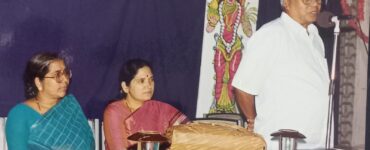The Dogra period resulted in favouritism towards the Hindus and it gave way to the socio-economic disparity. The ethno – religious identity consciousness broke out among the Muslim masses and it led to a mass uprising in 1931. The feudal bondage was opposed and there was a revolt against the Dogra rule and 13th July 1931 remained a historic day. The social unrest that followed the Dogra rule led to the formation of National Conference and the rise of national consciousness among the Kashmiris. In the period 1931–47, the nationalist movement in Kashmir advanced despite the attempts of militant Hindu and Muslim communal forces. As Sheikh Abdullah observed “the labourers, both Hindus and Muslims, equally became the prey to the capitalists. The laboring classes in Kashmir made more sacrifices during the last years of our freedom movement, but they did not gain anything out of it” (The Hamdard (weekly), Srinagar, 9 Oct., 1937, p.7).
Prominent among the post Dogra and the Nationalist movement times was Pandit Zinda Koul (1884-1965), known as masterji as he taught generations of people, who wrote not only in Kashmiri but in Persian, Hindi, and Urdu as well. However, he made his name by writing in Kashmiri. His well-known book in Kashmiri is Samran. The Sahitya Academy, India gave Pandit Zinda Koul an award in 1956.
In his Kashmiri poetry, he has written primarily on devotion and peace. His poetry was greatly influenced by Lal Ded and Parmanand. He translated the poems of the famous Kashmiri poet Parmanand into English which were published in three volumes. The following poem stands an example of the helpless urge of the human against the odds in life
Compulsion (majbu:ri)
One would cry and not restrain the tears,
But crying is of no avail,
Shedding incessant tears is of no avail,
And knocking one’s head against
boulders is of no avail.
And knowing that there is none to heed,
Why this urge to plead!
Why dash darts into the void!
Mere compulsion! Mere helplessness! …
One of the earliest nationalistic poets of Kashmir, who wrote several lyrical and patriotic poems with political themes, was Pirzada Ghulam Ahmad Mehjur (1885-1952). Especially noted for introducing a new style as well as a new thought into Kashmiri poetry, he wrote poems of freedom and progress in Kashmiri reflecting a new voice and a new form in his writings both in Persian and Urdu. His Kashmiri poetry was the best attempt to “free Kashmiri literature from heavy Persio-Arabic influence to take it out from literary stagnation.”
He wrote on such topics as love, communal harmony, and social reform, and also wrote on the plight of the Kashmiris. He wrote about youth, the flowers of Nishat Garden, a peasant girl, a gardener, the golden oriole, of the Happy Valley, its mountains and lakes, of the flora and fauna and of the woes of its poor and patient people and a free Kashmir. Even Rabindranath Tagore was impressed by his lyrical poem ‘The Farmer Girl’ and termed him as the ‘Wordsworth of Kashmir’. The way he synthesised culture and language in his verse was simply marvelous:
In my sleep thou bade me
Come and serve thee; I tread
Hill and dale to reach thee.
Thus I spent countless nights
In the late thirties, Mehjur focused his attention on social and political affairs when Kashmir had begun to feel the impact of the freedom movement in India. Mehjur was attracted to the freedom movement of National Conference and the second phase of his literary career coincides with this. Verses like the following urged the poor and the downtrodden to fight for their rights.
After day-long toil, I have to
Contend with the half-meal
The master doles out. Alas!
He realised my sad plight.
How long will the tyrants
Trample the weaklings’ rights?
A new awakening may be born
In the hearts of the downtrodden
His famous poem “Call to the Gardener” (1938) in which he gives a graceful call to “create a new spring” has over the period of time achieved the standing of a celebrated revolutionary anthem. The communal riots and the consequent untold human sufferings that accompanied partition of India in August 1947 touched Mehjur deeply and he articulated his pain and anguish in the following words:
Before the four corners of India
Were bathing in the sunshine of
Independence, lakhs were pushed
Into the cauldron of hatred.
Alas! Freedom brought in its wake
Nothing but a long shadow of
Anarchy, poverty, deprivation
And sad, divided households.
As he grew in years he became more responsive to the need for inculcating higher values and advocated the pluralistic approach as is found in his words, “Mosques, temples, churches, hospices, and holy places; enter these many houses I will build but one doorway.”
As one follows the political trajectory that Kashmir experienced, it is apparent that the Nationalist forces reacted strongly and sharply to the Pakistan movement led by Jinnah. The ‘Quit Kashmir’ movement was launched by AJKNC to counter the threat of Muslim communalism. Sheikh Abdullah was arrested by the Maharaja and to rescue him Nehru visited Kashmir with a team of lawyers. He was also arrested and Maulana Azad and Nehru complained about the events to Gandhi. Gandhi visited Kashmir and the Quit Kashmir agitation, led by Sheikh Abdullah achieved its objective. On the other hand Jinnah’s failure in controlling Kashmir on the religious cause made him think of wresting it by force. The raiders were sent in the form of army and units and irregulars and as Tariq Ali* states “they were so busy in looting and raping”. “Instead of inspiring a hope in the chastity of the cherished Islamic state, they earned the wrath of the people for Pakistan” (Prakash Chandra). The Maharaja fled the country and Sheikh Abdullah requested Nehru to send the troops to rescue Kashmir. Hari Singh signed an IoA – Instrument of Accession in favour of India and Nehru sent the troops on 25th October 1947 after Kashmir had legally been acceded to India.
The Indian constitution came into force and Article 370 accorded special status to Kashmir. In 1956 J&K adopted its constitution and defined itself as an integral part of India. The three wars between India and Pakistan, several political disturbances and the rise of militancy disturbed the peaceful conditions of Kashmir. On the 5th of August, 2020 Article 370 and 35A were repealed and J&K got bifurcated as two Union Territories of Ladakh and J&K. Important Kashmiri poets of the post-independence period include Abdul Ahmad Azad, Dinanath Nadim, Amin Kamil, Ghulam Rasul Nazki, Rahman Rahi, Abdul Haqq Barq and Nur Mohammed Roshan.
Among the prominent Kashmiri poets of this era is Mir Ghulam Rasool Nazki (1910-1998) who is credited with the revival of quatrain poetic form in Kashmiri literature, which originally was the excellence of poets such as Lal Ded and Nund Reshi. His first volume of poetry is titled Deedai followed by works like Ekand Hilad Kiki Dua, Chirageraah and Mataifaqeer. Rasool Nazki’s poetry lends a panoramic view to unending cosmos of possibilities. He touches upon a gamut of issues that include social, religious, ethical, philosophical, meta-physical and real life issues. Nazki’s contribution to Kashmiri and Urdu poetry and thought, through his fusion of oriental and occidental heritage is immense because it is in his works that the Rubai of Khyaam, the Saqi of Hafiz, Shaheen of Iqbal and Rhyme of Gani Kashmiri come together. Being well aware the collective social transformation he has been witness to, he prefers to repair the society instead of creating a new one by demolishing the existing one. He is worried about the vanishing of vernacular ethos and deflation of rich cultural traditions. He received the Sahitya Academy award.
He is the merry laughter and wailing shriek,
He is the hapless lamb and butcher’s knife is also His
He is the seller, and the buyer is He,
Tell me friend! Whom do you cheat?
What was destined and what I did
Compare my Lord ! I humbly say,
Any discrepancy if you find
Put it on me as you may
In reality your foe is your friend,
His animosity turns you to your God;
your friends are enemies in that they
keep you merry and away from Lord
G R Nazki (Trans. AyazNazki)
Acclaimed as one of the most renowned Kashmiris of the post independent 20th century, Dinanath Nadim (1916-1988) was raised by his illiterate mother and her recitals of Lal Ded’s sayings. Deeply influenced by the ideas of Bhagat Singh from childhood, he was interested in politics, freedom and progressivism which are illustrative in his lines;
Burn and burn like a colorful field of la:liza:r!
Roar and roar like a waterfall!
You are fire
A furious fire of burning youth
Come out
And cross the hills and dales
Raise a storm!
Be a storm!..
Why should the share of a labourer
be taken by a capitalist?
Why should a honey bee
circle the flowers and take away their honey?
Having composed poetry in English, Hindi, and Urdu in the earlier times of his poetic career, later he moved to writing mostly only in Kashmiri with great grace and craftsmanship. He depicted the beauty and the poverty of Kashmir in all of his poetry. The following is an example:
A lost stray cloud
Floating aimlessly with the moon
As if a beggar woman holds a leftover lump of watery rice
In the corner of her headcover.
Nadim introduced various poetic styles into Kashmiri. He was the first Kashmiri poet to write in blank verse, Ba Gyavna Az, (I Shall Not Sing Today), is a good example of it. Another stylistic innovation, in the form of the dramatic monologue, came in trivanzah (“Fifty-three”). The secret of Nadim’s art seems to lie in his intuition for an effortless use of a limited but highly appropriate vocabulary, a keen ear for the sound and rhythm of his native language, and, above all, an artist’s instinct for combining all his formal apparatus in fresh imagery. His poems like Yirada, Ba Gyavna Az and Zindabad Shyamji brought new vigour into Kashmiri verse. He also wrote an opera called Bambur Yambarzal in 1953, for which he won the Sahitya Akademi Award in 1967. Nadim joined hands with Roshan and produced another opera, Himal ta Nagaraya in 1956. Rahman Rahi is also a recipient of the Sahitya Akademi Award (1962) for his Nauroz-i-Saba.
Other notable poets and writers of 20th Century Kashmir, who wrote either in Kashmiri or Urdu or sometimes both, and were influenced by the progressive movement are: Rahman Rahi, Ghulam NabiKhayal, Ghulam NabiFiraq, Prem Nath Pardesi, NN Raina, Ghulam Rasool Renzu, GM Rajpuri, Ali Mohammad Lone, Abdul Sattar Ranjoor, Arjun Dev Majboor, Mahender Raina, Kanwal Nain Parwaz, Akhtar Mohiudin, Som Nath Zutshi, Qaisar Qalandhar, Bansi Nirdosh, Nand Lal Ambardar, Prem Nath Premi, Deepak Koul, Tej Bahadur Bhan and some others.
A close associate with Progressive Writers’ Movement, Amin Kamil (1924–2014) is a major voice in Kashmiri poetry is an exponent of ghazal in its present form. Kamil’s collection of Sufi poetry is an authoritative text and is widely acclaimed. He is an adept translator which gets reflected in his translations of collected verse of Nund Rishi and Hubba Khatun. His translation of Tagore’s Dak Ghar, as also the poetry of the Urdu poet Iqbal are significant additions to translated literature in translation available in Kashmiri.
Kamil has also composed poems in the Nazm form (significant genre in Urdu poetry). His use of various literary forms, which are paired with his characteristically native voice, has the quality of being simple and he has never been tempted to the borrowing of an alien metaphor or a foreign concept or trend in literature. His mastery over prosody and nuanced understanding of his chosen language has also contributed towards this incomparable excellence. Kamil won the Sahitya Akademi Award in 1967 for his book of poems, Laveh Te Praveh (Dewdrops and Sunbeams).
In Water
You’re fraught with words, better go sit in water;
For they swell with meaning and glow more in water.
Look for the heart in the chest and roast it on embers
Look for the blood in the liver and drink it in water.
Tomorrow Kashmir will stretch in the sun like a desert,
The day after Ladakh and Leh will float in water.
Under the hollow banks frightened waves take refuge;
Lord Jaldev is born with fire in water.
At mid day, even the sun gets soaked in sweat;
At the end, even the moon catches fire in water.
Even in excitement, sometimes, people set towns on fire;
Even for fun, sometimes, people pour poison in water.
The lost cow is looking for the elevensome, would someone tell her?
Five drowned in dry land, six are aflame in water.
The peddler of ghazals, this Kamil, makes fiery calls
But the fatefrost people are coldly sleeping in water.
(Translation by Muneebur Rahman)
***
In the contemporary Kashmiri literary scene Abdur Rehman Rahi (1925-), the greatest living doyen of Kashmiri literature who has created enormous poetic treasures like Siyah Roode Jaren Manz (In Black Showers) and other collections and has been rightly bestowed with the country’s highest honour of letters “The Gyanpith” in 2007. Initially, Rahi was strongly influenced by the progressive movement and the revolutionary leanings. He commemorates the suffering of the peasants and workers by writing “Dried up the streams, they died by drowning”, yet his poetry rises above any narrow definitions as it engages with the human reality in all its hues where, at times, “Life is nothing but dark downpour.” The suffering and the chilling truth of modern Kashmir which is now beset with conflict for the last three decades is strikingly captured in these lines of his poetry.
Even the breeze spies on you
You can’t even greet someone here, and you speak of a dialogue
Pity the times, when you have to sew your tongue!
What to do when none has tolerance to hear
He feels that ‘It’s not in the poet’s domain to become a politician,” and argues “but the political, which is like the air we breathe, has to be conveyed with one’s craft in such a manner so that you can enact the death of a boy on the street and the reader (the ruler) must feel they are reading about their own death.” His strong desire is to “raise the standard of the Kashmiri language so that it achieves a status on par with the great languages of the world in which literature is written; to bring it to the notice of world’s great writers so that they know what’s happening with this language.”
He feels sad that the current Kashmiri readership and even the linguistic milieu are not quite hopeful for Kashmiri as the language is not encouraged and spoken:
Almighty, show mercy, guide us to the path of freedom
Every word of this flower garden they barter with a bomb
If a window opens the breadth of an eyelid, a pellet gun robs the eye of light
Pepper guns make the air bitter, metonymy, a lung pogrom
This was written during September 2016 as his expression of anguish over the suppression that the Kashmiris underwent. He says, “As a poet, this is my protest against it. I can’t do anything else.”
The Kashmiri poetry of the late 20th and the early 21st centuries, especially the past decade is termed as ‘poetry of resistance’. The current generation of young poets, majority of them stationed abroad, write poetry that portrays the complex predicament of ‘suffering and oppression’.
According to poet and academic Huzaifa Pandit, in the ’90s, there arose a specific genre of music that spoke of grief and longing of a mother and sister looking for a messenger to deliver their pain to the son who had crossed the border. “Although this has not yet been catalogued, that too must be considered under this rubric… Post 2008 uprising, the genre achieved centre stage due to the availability of social media. Kashmiris – both Kashmiri Muslims and Kashmiri Pandits began expressing themselves in unprecedented ways,”- he says.
These poets strongly feel that their writings should fight the loss of collective memory which is constantly tried to be replaced with no memory or alternative memories as this would lead to the very loss of their identities. Thus poetry for them is a form of political activism that fights the forced forgetfulness. “A common thread in my work, however, would be memory. A counter-memory. A memory antithetic to the state memory, to the oppressor’s memory” – says Umair Bhatt.
Zia, the editor-founder of Kashmir Lit, says “all forms of poetry are a resistance of a certain type. In a condition of occupation like Kashmir, in a climate of repression, poetry becomes a foremost lifesaver in the absence direct expression, …”. “The work coming out from Kashmir is distinct and the purpose is to subvert the idea of normalcy orchestrated by the state” says another poet. “When you read a poem, you become a part of the poem. You might become me in that poem. I have written on Kashmiri pandits. It was a loss for me. I have an affinity. I smell my culture and I am attached to the exiled,” says Mohammad Tabish. “It is also in Kundera’s words, a site of struggle of memory against forgetting. My poems allow me to be a witness, a memoirist, and a wanderer.Yearning, loss, memory, dissent, nostalgia, resistance to institutionalised forgetfulness, are some recurring themes in my work” feels Uzma Falak.
*









Add comment